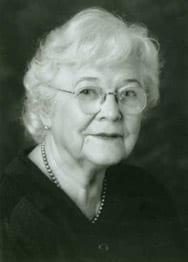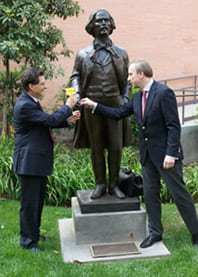 January 2015 marks the 30th anniversary of the Polish Music Center at USC—a library and outreach center established for the promotion of Polish music and culture that has no equal anywhere in the world. The PMC was founded in January 1985 by retired music educator and a USC alumna Wanda Wilk (1921-2009), who had discovered that the USC libraries held precious little material on Polish music. Wanda Wilk resolved to organize an institution focused solely on Polish music, with the goal of supporting and propagating scholarly endeavors on the subject, as well as popularizing the repertoire amongst audiences and performers, especially those for whom Polish Music was unfamiliar. With her unbridled enthusiasm, unparalleled generosity and a singular focus on her mission, Wanda led the Center for the first ten years of its operations. She organized many concerts and lectures, solicited leading Polish composers to donate to the Center’s incomparable Manuscript Collection, and began partnerships with various publishers in Poland, who sent books, recordings and music scores to the PMC library.
January 2015 marks the 30th anniversary of the Polish Music Center at USC—a library and outreach center established for the promotion of Polish music and culture that has no equal anywhere in the world. The PMC was founded in January 1985 by retired music educator and a USC alumna Wanda Wilk (1921-2009), who had discovered that the USC libraries held precious little material on Polish music. Wanda Wilk resolved to organize an institution focused solely on Polish music, with the goal of supporting and propagating scholarly endeavors on the subject, as well as popularizing the repertoire amongst audiences and performers, especially those for whom Polish Music was unfamiliar. With her unbridled enthusiasm, unparalleled generosity and a singular focus on her mission, Wanda led the Center for the first ten years of its operations. She organized many concerts and lectures, solicited leading Polish composers to donate to the Center’s incomparable Manuscript Collection, and began partnerships with various publishers in Poland, who sent books, recordings and music scores to the PMC library.
Starting in a small basement room next to the Music Library, over the next few years the Center gradually moved across the USC campus to slightly larger headquarters in the University Church basement, then to the second floor of the same building. In the meantime, on Wanda’s urging, such musical icons as Witold Lutosławski, Henryk Mikołaj Górecki and Stanisław Skrowaczewski accepted invitations for a residency on the USC campus. Visits by such great musicians were milestones not only for the PMC, but also for the Thornton School of Music under whose wings the Center operates, for the entire University of Southern California community, and for Los Angeles classical music scene as a whole. After a decade at the helm of the Polish Music Center, Wanda reluctantly decided to retire and a new director, noted musicologist Dr. Maja Harley-Trochimczyk, took over the Center’s reins in 1996. Many more distinguished concerts and conferences followed, and the tradition of Paderewski Lecture-Recitals began in the early 2000s with composers Zygmunt Krauze and Joanna Bruzdowicz initiating this prestigious series. Dr. Trochimczyk also continued and expanded the list of titles in the PMC’s Polish Music History books series that her predecessor had launched with volumes devoted to Karol Szymanowski and Grażyna Bacewicz. Under Dr. Trochimczyk’s editorship, books about Chopin, Karol Szymanowski’s vocal music, and a monograph on Józef Koffler were published.
 Since 2004 the Polish Music Center resides in the largest space it has ever had—an entire wing on the ground floor of Stonier Hall, right in the heart of USC’s downtown L.A. campus. New Director Marek Zebrowski and Assistant Director Krysta Close took over running the Center as it moved to its new headquarters in August of 2004. Books about Maria Szymanowska and Zygmunt Stojowski were published and the Paderewski Lecture-Recitals series continued with Marta Ptaszyńska, Paweł Łukaszewski, Krzesimir Dębski, and Lady Camilla Panufnik gracing us with their presence. New and very important collections of manuscripts and memorabilia of Ignacy Jan Paderewski, Zygmunt Stojowski, Henryk Wars, and Bronisław Kaper were added to the PMC Manuscript Collection.
Since 2004 the Polish Music Center resides in the largest space it has ever had—an entire wing on the ground floor of Stonier Hall, right in the heart of USC’s downtown L.A. campus. New Director Marek Zebrowski and Assistant Director Krysta Close took over running the Center as it moved to its new headquarters in August of 2004. Books about Maria Szymanowska and Zygmunt Stojowski were published and the Paderewski Lecture-Recitals series continued with Marta Ptaszyńska, Paweł Łukaszewski, Krzesimir Dębski, and Lady Camilla Panufnik gracing us with their presence. New and very important collections of manuscripts and memorabilia of Ignacy Jan Paderewski, Zygmunt Stojowski, Henryk Wars, and Bronisław Kaper were added to the PMC Manuscript Collection.
 Honoring Ignacy Jan Paderewski, who received his honorary doctorate from USC in 1923, the Center spearheaded a fund drive to place a monument to Paderewski on the USC campus—this statue is pictured at right, with Thornton School of Music Dean Robert Cutietta and then Polish Minister of Culture Bogdan Zdrojewski. Having accomplished this task thanks to generosity of Polish Americans and many others to whom Paderewski was an important figure in the world of music, politics and humanitarian relief, the PMC moved to restore the annual Paderewski Festival in Paso Robles, which had been suspended after a devastating earthquake in the early 2000s. During the past 10 years, the Paderewski Festival has grown from one concert in 2006 to its current schedule of a four-day feast of concerts, lectures, special exhibits, accompanied by wine-tastings and sight-seeing excursions to vineyards and almond ranches once owned by Paderewski. Since 2009, the Paderewski Cultural Exchange program—jointly administered by the Province of Tarnów and the Paderewski Festival in Paso Robles, and coordinated by the Polish Music Center—creates outstanding opportunities for young musicians from California’s Central Coast to visit Paderewski’s manor house in Kąśna Dolna for a week of master classes and concerts. In alternating years, the Paderewski Festival and the PMC have hosted young Polish and Ukrainian pianists for a program of concerts and educational opportunities (as well as some sightseeing) in Paso Robles and Los Angeles.
Honoring Ignacy Jan Paderewski, who received his honorary doctorate from USC in 1923, the Center spearheaded a fund drive to place a monument to Paderewski on the USC campus—this statue is pictured at right, with Thornton School of Music Dean Robert Cutietta and then Polish Minister of Culture Bogdan Zdrojewski. Having accomplished this task thanks to generosity of Polish Americans and many others to whom Paderewski was an important figure in the world of music, politics and humanitarian relief, the PMC moved to restore the annual Paderewski Festival in Paso Robles, which had been suspended after a devastating earthquake in the early 2000s. During the past 10 years, the Paderewski Festival has grown from one concert in 2006 to its current schedule of a four-day feast of concerts, lectures, special exhibits, accompanied by wine-tastings and sight-seeing excursions to vineyards and almond ranches once owned by Paderewski. Since 2009, the Paderewski Cultural Exchange program—jointly administered by the Province of Tarnów and the Paderewski Festival in Paso Robles, and coordinated by the Polish Music Center—creates outstanding opportunities for young musicians from California’s Central Coast to visit Paderewski’s manor house in Kąśna Dolna for a week of master classes and concerts. In alternating years, the Paderewski Festival and the PMC have hosted young Polish and Ukrainian pianists for a program of concerts and educational opportunities (as well as some sightseeing) in Paso Robles and Los Angeles.
To commemorate this year’s important anniversary, the Polish Music Center would like to present our audiences with a special challenge. In the coming months, please consider making a $30 contribution to the Polish Music Center on the occasion of our thirtieth anniversary. A symbolic $1 for each year we have supported scholars, educated and entertained audiences, and promoted Polish music is quite a bargain—and we want to hear from as wide a circle of our listeners and supporters as possible. To donate, please mail your check to: USC Polish Music Center, 840 W. 34th St., Los Angeles, CA 90089-0851, or visit https://giveto.usc.edu—you will find a PMC checkbox under University-wide Giving Opportunities > Centers and Institutes > Music. All donations must indicate “USC Polish Music Center,” either in the remittance line of your check or the online form, to ensure your contribution is routed directly to us.
Your 30th anniversary donation lets us know that you support our mission and care about what we accomplish. We hope that what we do actually matters to you, that it sustains your pride in Polish heritage, and that we have—at some point during the past thirty years—made at least a small and positive contribution in the quality of your life in this part of the world.
Thank you! Dziękujemy!
